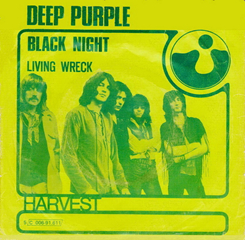This article needs additional citations for verification .(January 2015) |
| "Black Night" | ||||
|---|---|---|---|---|
 | ||||
| Single by Deep Purple | ||||
| B-side |
| |||
| Released | 5 June 1970 | |||
| Recorded | May 1970 | |||
| Studio | De Lane Lea Studios | |||
| Genre | ||||
| Length | 3:28 | |||
| Label |
| |||
| Songwriters | ||||
| Producer | Deep Purple | |||
| Deep Purple singles chronology | ||||
| ||||
| Official audio | ||||
| "Black Night" (1995 Remaster) on YouTube | ||||
"Black Night" is a song by the English hard rock band Deep Purple, released as a single in June 1970. "Black Night" became a hit in August 1970 peaking at No. 1 on UK New Musical Express and Melody Maker charts, while reaching No. 2 on the UK singles chart, and remains Deep Purple's highest charting UK single. It also topped the chart in Switzerland, and is one of only two singles from the band to chart in Ireland, peaking at No. 4, thus making it the group's only Irish Top 10 hit. It was later included on the 25th anniversary version of their 1970 studio album, Deep Purple in Rock .